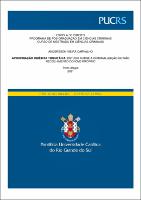| Share record |


|
Please use this identifier to cite or link to this item:
https://tede2.pucrs.br/tede2/handle/tede/10101| Document type: | Dissertação |
| Title: | Apropriação indébita tributária : estudo sobre a criminalização do não recolhimento do ICMS próprio |
| Author: | Carvalho, Anderson Vieira  |
| Advisor: | D’Avila, Fábio Roberto |
| Abstract (native): | O tema da presente dissertação é o estudo dos delitos tributários, delimitado à abordagem do chamado crime de apropriação indébita tributária, previsto no artigo 2º, inciso II, da Lei nº 8.137 de 1990. Este delito ensejou, nos últimos anos, interessantes debates em decorrência de decisões proferidas nos julgamentos do Habeas Corpus nº 399.199/SC, do Superior Tribunal de Justiça, e no Recurso Ordinário em Habeas Corpus nº 163.334/SC, do Supremo Tribunal Federal. Segundo os entendimentos firmados nos julgados, o agente que deixa de recolher ao fisco, dentro do prazo legal, o Imposto sobre Circulação de Mercadorias e Serviços – ICMS, oriundo de operações próprias, incide na prática do delito previsto no artigo 2º, inciso II, da Lei nº 8.137 de 1990. Com base nisso, apresentou-se como problema de pesquisa o questionamento sobre em que medida a falta de recolhimento do ICMS oportunamente declarado nas guias adequadas e relativo à dívida por operações próprias do contribuinte pode configurar o crime previsto no artigo 2º, inciso II, da Lei nº 8.137 de 1990 à luz da ofensividade em direito penal. Depois de realizado o estudo a partir do questionamento apresentado, chegou-se à conclusão de que a conduta considerada criminosa por conta das decisões estudadas é materialmente inconstitucional, vez que não carrega consigo qualquer ofensa ao bem tutelado. Primeiro, por não haver necessidade de tutela do bem jurídico pelo direito penal, o que é circunstancial à ofensividade. Segundo, porque seguindo as normas de direito tributário, não há qualquer espécie de apropriação por parte do contribuinte que deixa de recolher aos cofres públicos, dentro do prazo legal, o ICMS devidamente declarado e proveniente de operações próprias. Desse modo, a conduta criminalizada por meio das decisões das Cortes Superiores é materialmente inválida, por não apresentar qualquer espécie de ofensa ao bem jurídico que se visa tutelar pela norma penal. |
| Abstract (english): | The theme of this dissertation is the study of tax offenses, delimited to the approach of the so-called crime of misappropriation of taxation, provided for in Article 2, item II, of Law No. 8,137 of 1990. This offense has led, in recent years, interesting debates due to decisions given in the judgments of Habeas Corpus No. 399.199/SC, the Superior Court of Justice, and the Ordinary Appeal in Habeas Corpus No. 163.334/SC, of the Supreme Court. According to the understandings established in the judgments, the agent who ceases to collect from the tax authorities, within the legal period, the Tax on Circulation of Goods and Services - ICMS, derived from own operations, focuses on the practice of the offense provided for in Article 2, item II, of Law No. 8,137 of 1990. Based on this, the research problem presented as a research problem the question about the extent to which the lack of collection of ICMS timely declared in the appropriate guides and related to debt by the taxpayer's own operations can configure the crime provided for in Article 2, item II, of Law No. 8,137 of 1990 in the light of the offense in criminal law. After the study was carried out based on the questioning presented, it was concluded that the conduct considered criminal because of the decisions studied is materially unconstitutional, since it does not carry with it any offense to the protected property. First, because there is no need for protection of the legal good by criminal law, which is circumstantial to the offence. Second, because following the rules of tax law, there is no kind of appropriation by the taxpayer that ceases to collect to the public coffers, within the legal period, the ICMS duly declared and coming from own operations. Thus, the conduct criminalized through the decisions of the Superior Courts is materially invalid, for not presenting any kind of offense to the legal good that is intended to protect the criminal norm. |
| Keywords: | Direito Penal Direito Tributário Crimes Tributários Apropriação Indébita Tributária Ofensividade |
| CNPQ Knowledge Areas: | CIENCIAS SOCIAIS APLICADAS::DIREITO |
| Language: | por |
| Country: | Brasil |
| Publisher: | Pontifícia Universidade Católica do Rio Grande do Sul |
| Institution Acronym: | PUCRS |
| Department: | Escola de Direito |
| Program: | Programa de Pós-Graduação em Ciências Criminais |
| Access type: | Acesso Aberto |
| Fulltext access restriction: | Trabalho será publicado como artigo ou livro |
| Time to release fulltext: | 36 meses |
| Date to release fulltext: | 24/02/2025 |
| URI: | http://tede2.pucrs.br/tede2/handle/tede/10101 |
| Issue Date: | 24-Feb-2021 |
| Appears in Collections: | Programa de Pós-Graduação em Ciências Criminais |
Files in This Item:
| File | Description | Size | Format | |
|---|---|---|---|---|
| DIS_ANDERSSON_VIEIRA_CARVALHO_COMPLETO.pdf | ANDERSSON_VIEIRA_CARVALHO_DIS | 1.45 MB | Adobe PDF |  Download/Open Preview |
Items in DSpace are protected by copyright, with all rights reserved, unless otherwise indicated.




